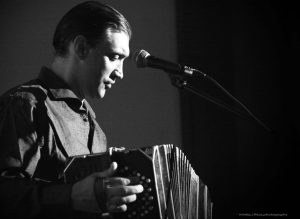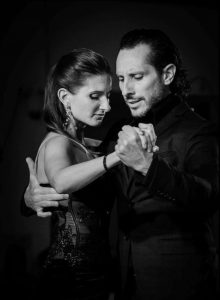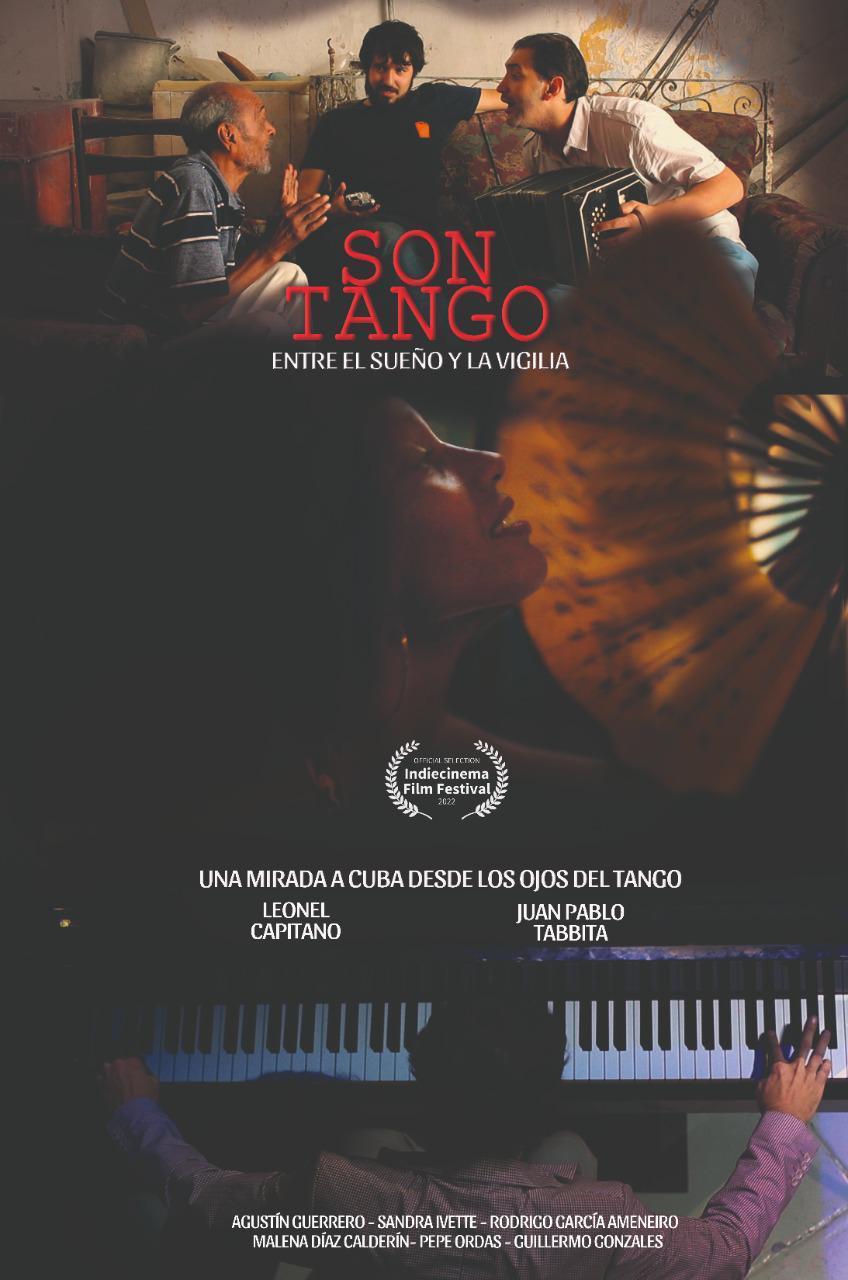Mon 04 July, 19:00 – SON TANGO: entre el sueño y la vigilia – musical documentary, live concert & Tango milonga
€ 10,00
04 July 2022
Starts: 19:00
Doors: 18:30
Screening of the music documentary, dance presentation & milonga.
Out of stock
https://www.youtube.com/watch?v=EwryCXTOwSU
"SON TANGO: entre el sueño y la vigilia" (musical documentary); a look at Cuban society from the point of view and aesthetics of tango. Directed by: Leonel Capitano and Juan Pablo Tabbita.
After the screening of the documentary "Son Tango, entre el sueño y la vigília", we will have a live concert with the Argentinean bandeonist and singer Leonel Capitano, one of the directors of the film.
During the concert, the audience will be welcome to dance the milonga.
About the documntary
Son Tango is a musical enquiry, but above all an audiovisual one; it is about cinema, and here the music officiates as one more element, and although it is the most important, it will be consistent with the staging, dedicated to the portrait of an experience as vital as it is happy. Tabbita/Capitano's documentary opens up a world to be inhabited, it sings melodies, combines life stories, and discovers the music in the body, the words and the walls, those walls of Havana that say so much, as peeling as they are stoic.
The reference to the song dedicated to the canoero, "Cayuquero del Yumurí", takes a long time to emerge, the film delays it - without having warned the spectator, who may or may not know this, there is no need - and stops at other stations, other episodes and other stops. It does so as a succession of actions that emerge juxtaposed from memory, as if they were all part of the same long day/night. There are recordings, dialogue tables, chords in friendly houses, people and flags in the Plaza de la Revolución, popular neighborhoods and dances in the street. Every Son Tango is a celebration. Precisely, tango is the key through which Capitano speaks, with his voice or with the bandoneon. In doing so, the dialogues with the others arise by themselves, the musical response is assured, and this is something he obviously knows, by intuition or wisdom, however, but with the certainty that in the rhythmic communion something deeper is inscribed. It is about historical and political roots, which come to the surface.
The course of the journey will finally lead to the encounter with the beloved canoeist. There, in the canoe and among the stories of the times of the conquest that the canoeist recalls, is where Capitano will make the song he promised to sing heard. If the montage, up to this point, had favoured a profusion of situations that functioned as an ensemble, in the manner of a great jigsaw puzzle, it is here that it withdraws and allows the musician and the song to take place before the canoeist's gaze. Time rests, the song speaks. But above all and also, the gestures and the look of the one to whom it is addressed.
Son Tango is a pleasant surprise, it has a relevant visual and narrative power. It works as a great fresco, a fresco that knows how to synthesize the musical and experiential experience of its protagonists. At the same time, it invites to a plural journey. There are those who look through the camera. There are those who live what happens. And there is the one who observes what is happening, in front of the screen. The relationship is remarkably complementary in this film, because happily there is no intention of didacticism, but an invitation to the encounter and the explosion between the images and the music it contains. Twinned, mixed and happy music, from memories that bring with them ancestral histories, that inhabit the very bodies of those who dance in the streets. Images that reveal an insightful gaze, attentive to the green geography of the landscape and the cracks of the city, to the saturated colors and black and white; in short, images understood as notes capable of composing that other melody of its own rhythmic and explosive rhythm that cinema offers.
Capitano and Tabbita's film was selected for the Italian Independent Film Festival, and has already been scheduled for screenings in Barcelona, Paris, Luxembourg and Berlin. The musical journey of their images is just beginning.
About Leonel Capitano
 He was born in Rosario (Santa Fe), at the time of one of the deepest crisis of the genre. The influence of his maternal grandfather (Loco Castro, who was goalkeeper of Newell's Old Boys and Boca Juniors) made him begin to sing tangos when he was only three years old.
He was born in Rosario (Santa Fe), at the time of one of the deepest crisis of the genre. The influence of his maternal grandfather (Loco Castro, who was goalkeeper of Newell's Old Boys and Boca Juniors) made him begin to sing tangos when he was only three years old.
When still a teenager he joined the Orquesta Típica Baruyo which meant his start in the tango world of the city. Because of his talent evidenced at so early an age he represents a true hinge between the tango generations of the city. Likewise he had appeared also in different stages in the aggregations of maestros such as Domingo Federico and Cholo Montironi with whom he is still connected now.
He played in several aggregations: the Orquesta del Instituto Provincial del Profesorado de Música, the Quinteto Camandulaje, the Cuarteto Los Tauras, the Víctor Parma quartet and the group Cité Tango. His activity as soloist began in 2000, associated on occasions with music players of the level of Joel Tortul, Octavio Brunetti and Cristian Gustafsson, among others.
In his interpretive aspect he presents distinctive features that are scarcely usual. Like Rubén Juárez he sings accompanying himself on bandoneon. He has a tenor range and a deep warm voice.
He is a complete artist: bandoneonist, composer, researcher, broadcaster and educator. He is one of the founders of the Centro Cultural 1380, member of the group La Novata and author of the project ARDE TROYA (tango artists of Rosario and its surroundings). He is also member of the associations MUTAR (Músicos tangueros rosarinos) and ATAR (Asociación tanguera Antonio Ríos).
About Damián Rosenthal & Vanessa Fatauros

Damian Rosenthal and Vanessa Fatauros began their collaboration in 2014.
Their work is mainly based on a foundation of more traditional structure incorporating new elements and dynamics that enrich their dance. In 2014 and 2015 they have participated as teachers of the prestigious CITA in Buenos Aires and numerous workshops and exhibitions in Buenos Aires and Europe.
Vanessa Fatauros
was born in Amsterdam, from an Argentine father and a Dutch mother.
In 2003 she moved to Buenos Aires to continue her studies of Tango dancing. She studied mainly with Gustavo Naveira, Gisele Anne, Chicho Frumboli, Geraldine Rojas, Javier Rodriquez, Sebastian Arce y Mariana Montes, Ezequiel Paludi y Sabrina Masso.
He mainly studied with the maestros Gustavo Naveira, Fabian Salas and Chicho Frumboli during that time. Later on he also studied with maestro Sebastian Arce.
In 2000 he moved to Paris, where he lived for more than 10 years. During that time he developed a dance couple with Celine Ruiz, and together they participated in many Tango shows and took part of a several Tango dance company ( The "All that tango Dance company" Directed by Sebastian Arce & Mariana Montes. The "Compañia Argentina", directed by Anibal Panuncio & Magui Dani). They also participated in many prestigious Tango Festivals mainly in Europa but also in Asia and United States(Brussels Tango Festival, Istanbul Tango Encuentro, Roma Tango Meeting, Berlin Tango Festival, París Couleur Tango, Seoul Tango Festival, Chicago Tango Festival, etc.). He also participated several times as a Maestro in the renowned CITA(International tango Argentine Congress of Buenos Aires).
DJ: Damian Rosenthal.


